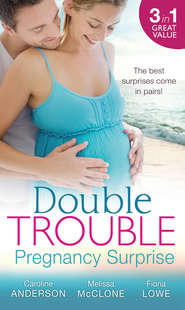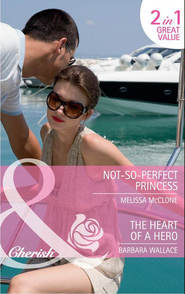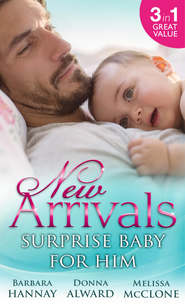По всем вопросам обращайтесь на: info@litportal.ru
(©) 2003-2025.
✖
Winning His Heart: The Millionaire's Homecoming / The Maverick Millionaire
Автор
Год написания книги
2019
Настройки чтения
Размер шрифта
Высота строк
Поля
“Have you heard something about Bastigal?” she asked eagerly.
“No, I’m sorry. I just brought you back your sweater.”
“Oh.” She looked crushed. “Thanks.”
She opened the door, and it screeched outrageously on rusting hinges. He noticed she didn’t even have the hook latched on it.
“Do you have a phone yet?” he asked.
“Not yet.”
“You should get one,” he said, “and you should lock your door. At least do up the latch on the screen.”
She looked annoyed at his concern, rather than grateful. “This is Blossom Valley,” she said. “You and I ‘prowling’ was probably the biggest news on the criminal front in years.”
“Bad stuff happens everywhere,” he said sternly.
“If it’s safe enough for you to sleep out under the stars, it’s safe enough for me to leave my screen door unlatched.”
He glared at her.
“The latch is broken,” she said with a resigned sigh. “The wood around it is rotted.”
“Oh.”
She bristled under what she interpreted as sympathy or judgment or both. “And how are you sleeping in the great outdoors? Fending off mosquitoes?”
Did she mutter a barely audible “I hope”?
Was he trying to control the locks on Kayla’s doors because his own world seemed so unsafe and unpredictable—beyond saving—at least where his mother was concerned?
Several retorts played on his tongue, never better, reminds me of my boy scout days—but it shocked him when the truth spilled out.
“I hate it in that house,” David said, his voice quiet. “I hate how the way it is now feels like it could steal the way it once was completely from my mind. Steal Christmas mornings, and the night I graduated from high school and the way my mom looked when my dad pinned that rose corsage on her for their fifteenth anniversary, right before he died. The way that house is now could steal the moment the puppy came home, and the memories of the dog he grew to be.”
He blinked hard, amazed the words had come out past the lump that had been in his throat since his mother had thrown her porridge at him, but then remembered the backyard skating rink.
David was both annoyed with himself and relieved to have spoken it.
Kayla’s bristling over her unlocked door, and her glee at his sleeping arrangements, melted. “Oh, David, I’m so sorry.”
He ordered himself to walk away, to follow his original plan to go to the lake and let the ice-cold water and the physical exertion take it all.
Instead, when the door squeaked open and Kayla stepped back, inviting him into her house, he found himself moving by her as if he had no choice at all.
He entered her kitchen like a man who had crossed the desert and known thirst and hardship, and who had found an oasis that promised cool protection from the harshness of the sun, and that promised a long, cold drink of water.
He looked around her kitchen. He had spent a lot of his growing-up years in this room and this room was as unchanged as his own house was changed.
A large French-paned window faced the backyard. It was already a bright room, but Mrs. Jaffrey had painted the walls sunshine-yellow, and though the yellow had faded, the effect was still one of cheer.
The cabinets were old and had seen better days, and nobody had that kind of countertop anymore. The table had been painted dozens of times and every one of the color choices showed through the blemishes in the paint. It was leaning unsteadily, one of the legs shorter than the others. The appliances were old porcelain models, black showing through the chipped white enamel.
The kitchen was unchanged, but still he felt something catch in his throat. Because although the room was the same, wasn’t this just more of the same of what was going on next door?
He could practically see Kevin sitting at that table, gulping down milk and gobbling down still-warm cookies, leaving dribbles of chocolate on his lips.
He could see Kevin’s devil-may-care smile, almost hear his shout of laughter.
David realized he had lied to Kayla when she had asked him why he had never chosen marriage and a family.
And when she had asked him if he ever missed this, for this kitchen was really the heart and soul of what growing up in Blossom Valley had been.
Right now, particularly vulnerable because of what had just happened with his mother, he missed how everything used to be so much that he felt like he could lay his head on that table and cry like a wounded animal.
Kevin was dead, but even before his death, had been the death of their friendship, which had been just as painful. Now, the Jaffreys had moved. It seemed shocking that Kayla was Mrs. Jaffrey now.
Really, with the death of his father, David felt as if he had begun to learn a lesson that had not really stopped since: love was leaving yourself open to a series of breathtaking losses.
And still, this kitchen softened something in him that did not want to be softened.
The kitchen was a mess of the nicest kind: recipe books open, mixing bowls out, blobs of yellowy batter—lemon chiffon cake, at this time of the day?—spattering the counter. David was painfully aware that there was a feeling of homecoming here that he no longer had at home.
He realized some of it was scent: Kayla’s scent, lemony and sweet, that clung to her, and the sweater he was holding. There was the fresh smell of the toast she’d had for breakfast, but underneath that he remembered more good things. He swore he could smell all the cookies that had ever been baked in that archaic oven, and Thanksgiving dinner, and golden-crusted pies that lined the countertops after the original Mrs. Jaffrey had availed herself of Blossom Valley’s apple harvest.
He compared that to the hospital smells of his mother’s house—disinfectants and unappetizing food heated in the microwave and smells he did not even want to think about—and he felt like he never wanted to leave this kitchen again.
“Mom asked me to return your sweater,” he said past the lump in his throat. “She remembered your name.”
Kayla scanned his face and took the sweater wordlessly from his hands, hanging it on the back of one of the chairs.
There. He’d done what he came to do. He needed to be in the water, to swim until his muscles hurt and until his mind could not think a single thought. Instead, he found himself reluctant to leave this kitchen that said home to him in a way his mother’s home would never do again.
Instead, he found himself wishing Kayla would press her hand over his heart again.
“Are you okay?” she asked him.
No. “Yes.”
But she seemed to hear the no as if he had spoken it.
She regarded him thoughtfully. It was as if she could see every sorrow that he carried within him.
“I’m trying out recipes in an effort to keep busy and keep my mind off Bastigal. Would you like to try some homemade ice cream?”
He thought of the congealed porridge at his house. He thought he had to say no to this. He was in a weakened state. This could not go anywhere good.
But suddenly none of that mattered. He had carried his burdens in solitude for so long and it felt, ridiculously, as if they could be eased by this kitchen, by her, by the appeal of homemade ice cream.











